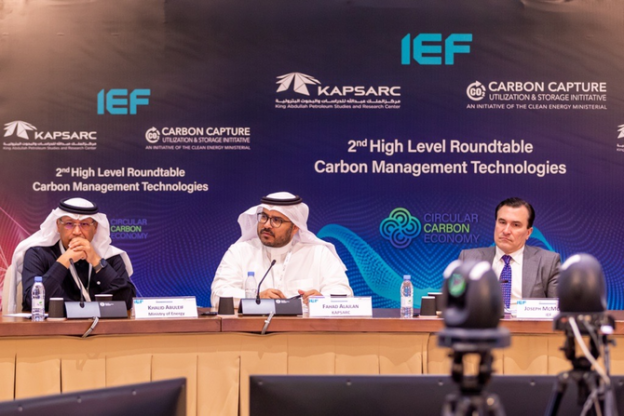RIYADH: The volume of global investment in carbon capture and storage projects has hit $6.4 billion in 2022, said Fatih Yilmaz, an expert in the Climate and Sustainability Program at the King Abdullah Petroleum Studies and Research Center.
Speaking during a panel discussion on carbon management techniques with the International Energy Forum and the Clean Energy Forum in Riyadh, Yilmaz highlighted that the average investment in CCUS projects ranged from $2 billion to $3 billion annually until 2022.
This indicates that last year witnessed a jump in the rate of investments in the sector, which further implies the need to invest in clean hydrogen.
Citing a recent study by the International Energy Agency which listed CCUS as one of the seven pillars of achieving net-zero by 2050, he added that there is an underlying need to reach a capacity to capture and store 8 million tons of carbon dioxide by 2050.
The world striving to achieve net-zero carbon emissions goals needs a new approach to attract investments to scale up carbon capture and storage capacity, said experts who participated in the roundtable.
“We cannot achieve net-zero without carbon capture, and we need to scale up carbon capture and storage over the coming years to deliver it,” said KAPSARC President Fahad Alajlan.
He added that the world needs a new approach to attract financiers to support CCUS initiatives.
Stressing on the importance of the roundtable, the KAPSARC president said such events will allow experts to share their knowledge and identify ways to promote carbon management technologies.
Speaking at the event, IEF Secretary General Joseph McMonigle, added: “We need to make 2023 the year of CCUS, and enhance collaboration to improve the investment in and usage of this technology.”
The panel, which comprised representatives from industry, government and academia also discussed ways to enhance investment momentum in CCUS projects to reach zero neutrality. It also addressed how large-scale investments can be de-risked through clear and cohesive policies.
Delegates also spoke about how carbon market initiatives and environmental, social and governance standards advance the circular carbon economy. In addition, they identified the CCUS synergies between hydrogen and material transitions.
A research consulting center, KAPSARC has so far published more than 700 research papers on topics ranging from climate change policy and governance to energy and economic diversification.
https://www.arabnews.com/node/2253941/business-economy





